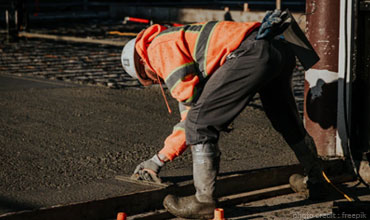
A floor screed is a thin layer of concrete composed of sharp sand particles and cement. It specialises in providing a clean and smooth finish as the final covering. Screed is used to cover the foundation concrete as floor covering on which tiles are laid out. Sometimes it is used to provide insulation and helps to cover up the underlying piping system.
Screed is used for both external & internal flooring solutions and can be customised as per the requirements and specifications. A good screed suppliersuggests that the strength of the screed mixture can be increased by adding various additives, and you can also get the desired effect by mixing a variety of chemicals. By adding fibre, you can prevent shrinkage and get a more crack-free floor. While by adding retarders, settling down slows down and lets you work on material.
Screed is composed of water-cement and fine aggregate, which is why it is more free-flowing than concrete, and that is why it is used for various purposes, like in the case of commercial and domestic construction. Furthermore, screed is also used in the case of industrial construction. So, finding the right screed supplier and getting a premium quality mix is important.
Screeds are of different types that you can use for various purposes. Let's have a detailed look at the following types of screeds.
Floating Screed: It is used to create a heat-efficient floor or more precisely called thermal flooring. In this case, the floating screed is laid on the top of the insulation to create the effect.
Bonded Screed: This type of screed is bonded onto the substrate with the help of a primer or bonding agent. Driveways, roadways, and car parking are generally made of this screed. This type of screed is ideal for places where huge pressure is expected as it has a thinner application.
Unbonded Screed: As the name suggests, it is not directly bonded with the base. The biggest benefit of an unbonded screed is that it has very few shrinkage issues, and it is directly poured over the damp proof membrane or placed on the top of base concrete to get the soothing effect.
Liquid Screed: It is the fastest drying screed composed of calcium sulphate. It is also called a self-compacting screed, which has the fastest drying times and can be used within 24-48 hours. Therefore it has become the most popular due to lesser drying & installation timing.
Underfloor Heating Screed: It is similar to a floating screed, but unlike a floating one, this screed is laid on the top of an underground heating system or heating pipes. It helps to retain heat for a longer period.
Screed has its benefits and disadvantages. While mixing the screed, it is essential to know all the pros and cons. A proficient screed supplier is the one who knows which screed goes with your requirements and how to apply it. Being a screed expert, West London Concrete knows what suits you the best and can provide you with a personalised and cost-effective solution.